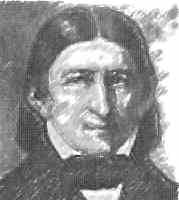Analyst: Richard Dantinne

Friedrich Froebel's Educational Theory
Analyst: Richard Dantinne |
 |
RETURN
edited 8/18/11
1. Theory of Value: What knowledge and skills are worthwhile learning? What are the goals of education?
Unity, individuality, and diversity. C59 Self-control. C60 Unity of God, nature, and humanity. C50 Spiritual development. C49 Success of the individual determines success of the race. C58 Schools should direct student will. C51 Nature is the center of all learning. C50 Mathematics, language, art, design, health, hygiene, and physical education should also be part of the curriculum. A46-61 Social development also very important. C572. Theory of Knowledge: What is knowledge? How is it different from belief? What is a mistake? What is a lie?
Schools should supply meaning and relationships to external unrelated knowledge and life experiences. C49 Associate facts into principles. C563. Theory of Human Nature: What is a human being? How does it differ from other species? What are the limits of human potential?
There are defined stages of infancy, childhood, boyhood, and manhood. C64 Human potential is defined by the accomplishments and work of the individual. C58 Only through maturation does man experience harmony -and completeness. C65 Humans are generally creative and productive. C654. Theory of Learning: What is learning? How are skills and knowledge acquired?
Free self-activity, observation, discovery, play. Investigation of properties. C59 Students' art work/drawing activities promote higher-level thinking skills. A224 Childhood games teach virtues. A231 Stories, fables, songs, crafts, nature and poetry are effective means of learning. B4 Reading and writing stem from child's need for selfexpression. A147 Activities are needed which stimulate imagination and develop motor skills. C595. Theory of Transmission: Who is to teach? By what methods? What will the curriculum be?
The teacher/student relationship should be one of equality, not authority. C56 Sensory experiences are crucial. C59 Parent and sibling involvement. C58 Selfexpression through life experiences. C49 The child's surroundings should provide the curriculum. C56 Union of school and family in educational process. C58 Teachers should lead students through discovery, not dictate what should be learned. C51 Constructivist approach using "gifts and occupations". A 171- 222 Importance of the mother's role in the educational process. C586. Theory of Society: What is society? What institutions are involved in the educational process?
Education defined by the law of divine unity, the connection of all things. C48 Importance of religion as part of the child's education. C49 Parent and sibling involvement. C58 An individual's actions and work productivity change culture, not acquisition of ideas. C58 Everything develops according to God's plan. C497. Theory of Opportunity: Who is to be educated? Who is to be schooled?
All students, regardless of religion or social class, can learn as long as they are developmentally ready for a specific area of instruction. B5 All students should be developed to their individual potential. C49 "Children are like tiny flowers; they are varied and need care, but each is beautiful alone and glorious when seen in the community of peers." B4 Every child deserves respect and treatment as an individual. C598. Theory of Consensus: Why do people disagree? How is consensus achieved? Whose opinion takes precedence?
Man must learn unity and also respect individuality and diversity. B5 Humans should share common experiences in the areas of religious maxims. C48 God's plan for moral and social order is supreme. C65